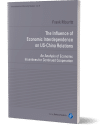 New with Budrich:
New with Budrich:
by Frank Mouritz
About the book
US-China tensions over global supremacy escalated over the last years, increasing the likelihood of a future conflict. However, an open conflict would have costly consequences for both sides due to the countries’ deep economic interconnectedness. Against this backdrop, the book addresses the question how high the incentives for both sides are to avoid conflict and continue cooperation out of economic considerations.
Frank Mouritz’ short vita in own words
 Frank Mouritz is a research associate at the Bundeswehr University Munich and at the George C. Marshall European Center for Security Studies. He has been the academic coordinator for a master’s program in International Security Studies since 2016 and worked on several studies for the German government. In 2020 he completed a PhD at the Faculty of Management, Economics and Social Sciences of the University of Cologne. He holds a bachelor’s degree in Social Sciences from the University of Cologne and a master’s degree in International Politics & East Asia from the University of Warwick.
Frank Mouritz is a research associate at the Bundeswehr University Munich and at the George C. Marshall European Center for Security Studies. He has been the academic coordinator for a master’s program in International Security Studies since 2016 and worked on several studies for the German government. In 2020 he completed a PhD at the Faculty of Management, Economics and Social Sciences of the University of Cologne. He holds a bachelor’s degree in Social Sciences from the University of Cologne and a master’s degree in International Politics & East Asia from the University of Warwick.
1) Dear Frank Mouritz, please summarize the content of your current publication The Influence of Economic Interdependence on US-China Relations for our readers.
US-China tensions over global supremacy escalated over the last years, increasing the likelihood of a future conflict. However, open conflict would have costly consequences for both sides due to the countries’ deep economic interconnectedness. Against this backdrop, the book addresses the question how high the incentives for both sides are to avoid conflict and continue cooperation out of economic considerations.
2) How did you get the idea to write this book?
I started following the debate about great power competition between China and the United States at the beginning of my master studies and noticed that in basically all articles, books, and talks at one point economic interdependencies are mentioned as something that gives both sides a reason to avoid conflict. What baffled me was that I could not find any literature about the exact extend of economic interdependences, let alone how much both sides would suffer economically from a political confrontation. This motivated me to take a closer look at the bilateral economic nexus and I found that there is so much more than just trade that makes both countries interdependent. The US and China are both vulnerable to a discontinuation of economic ties in so many different ways (e.g. supply chains, revenue exposure, food security, investments, government debts) that political leaders are highly incentivised to avoid a direct confrontation. Only the future will tell if that is enough to keep the increasing rivalry in check.
3) From your point of view, what is currently the greatest challenge for the deep economic interconnectedness of China and the US?
Policy makers in Washington and Beijing have initiated steps to decouple parts of their economies out of fear the other side could try to exploit dependencies; the pandemic only reinforced this trend. This desire is understandable as long as it only concerns so called strategic goods, but unravelling interdependencies at large is the wrong instinct. With political relations on a low point in the wake of “great power competition” and disputes about human rights in Xinjiang and democratic freedoms in Hong Kong, economic ties are the only thing left that still unites both countries and give reason to continue a constructive dialogue. Attempts to decouple the United States and China could ultimately lead to the formation of separate trade blocs that would increase competition to a point where the United States and China end up on a collision course.
4) How do you think decoupling would play out in the long run?
It would set a dangerous precedence if the two most important economic powers in the world would decide to de-integrate their economies. Other countries could follow the example and also try to reduce their dependencies on partner countries. This could have devastating consequences not only for the world economy but also for international security. Since economic interdependencies make conflicts less desirable for everybody, business links between countries should be fostered and not cut back. Any attempts by political leaders to de-integrate their countries from the world economy would make world politics more insecure and increase the prospects of economic disputes.
5) This is why I am author with Barbara Budrich
Right from the first contact I was welcomed with open arms and received the support I needed. The whole publication process was very straightforward. Whenever I had questions – be it technical or content wise – there was always someone who could give me a helpful answer. The whole team is very professional and at the same time you do not feel like working with strangers.
Order now via Budrich webshop
 Frank Mouritz: The Influence of Economic Interdependence on US-China Relations. An Analysis of Economic Incentives for Continued Cooperation
Frank Mouritz: The Influence of Economic Interdependence on US-China Relations. An Analysis of Economic Incentives for Continued Cooperation
International and Security Studies, Band 9
© author’s photo: private
© header image: Sketchify <https://www.canva.com/p/sketchify/>
created with canva.com <https://www.canva.com/>

